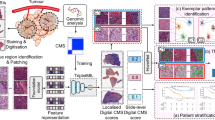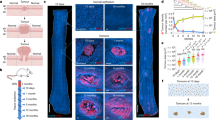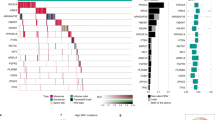Abstract
To obtain functional evidence for DCC as a tumour suppressor associated with endometrial cancer, the human DCC cDNA encoding a complete open reading frame (ORF) was transfected into highly tumorigenic human endometrial carcinoma cells, HHUA and Ishikawa in which DCC expression was completely deleted. Reconstituted expression of DCC in HHUA had little effect on in vitro growth, but suppressed tumour formation in mice completely. The clones from Ishikawa had abundant DCC expression similar to that in normal endometrium. Their growth in vitro was suppressed and showed apoptotic phenotype. Lower levels of DCC expression in the prolonged passaged clones did not induce apoptosis, but still had the potential to suppress tumorigenicity. These observations imply a role of DCC in regulation of normal endometrial cell growth, and categorize DCC as the tumour suppressor gene for endometrial cancer. © 2000 Cancer Research Campaign
Similar content being viewed by others
Article PDF
Change history
16 November 2011
This paper was modified 12 months after initial publication to switch to Creative Commons licence terms, as noted at publication
References
Brewster SF, Gingell JC, Browne S and Brown KW (1994) Loss of heterozygosity on chromosome 18q is associated with muscle-invasive transitional cell carcinoma of the bladder. Br J Cancer 70: 697–700
Cho KR, Oliner JD, Simons JW, Hedlick L, Fearon ER, Presinger AC, Hedge P, Silvermann GA and Vogelstein B (1994) The DCC gene: structural analysis and mutations in colorectal carcinomas. Genomics 19: 525–531
Chomoczynski P and Sacchi N (1987) Single-step method of RNA isolation by acid guanidium thiocyanate-phenol-chloroform extraction. Anal Biochem 162: 156–159
Clifton DR, Goss RA, Sahni SK, van Antwerp D, Baggs RB, Marder VJ, Silverman DJ and Sporn LA (1998) NF-kappaB-dependent inhibition of apoptosis is essential for host cell survival during Rickettsia rickettsii infection. Proc Natl Acad Sci USA 95: 4646–4651
Devileei P, van Vlietl M, Kuipers-Dijkshoorn N, Pearson PL and Cornelisse CJ (1991) Somatic genetic changes on chromosome 18 in breast carcinomas: is the DCC gene involved?. Oncogene 6: 311–315
Enomoto T, Fujita M, Cheng C, Nakashima R, Ozaki M, Inoue M and Nomura T (1995) Loss of expression and loss of heterozygosity in the DCC gene in neoplasms of the human female reproductive tract. Br J Cancer 71: 462–467
Fazel A, Dickinson SL, Hermiston ML, Tighe RV, Steen RG, Small CG, Stoeckeli ET, Keino-Masu K, Masu M, Rayburn H, Simons J, Bronson RT, Gordon JI, Tessier-Lavigne M and Weinberg RA (1997) Phenotype of mice lacking functional deleted in colorectal cancer (DCC) gene. Nature 386: 796–804
Fearon ER, Cho KR, Nigro JM, Kern SE, Simons JW, Ruppert JM, Hamilton SR, Preisinger AC, Thomas G, Kinzler KW and Vogelstein B (1990) Identification of a chromosome 18q gene that is altered in colorectal cancers. Science 247: 49–56
Gao X, Honn KV, Grignon D, Sakr W and Chen YQ (1993) Frequent loss of expression and loss of heterozygosity of the putative tumor suppressor gene DCC in prostatic carcinoma. Cancer Res 55: 2723–2727
Gima T, Kato H, Honda T, Imamura T, Sasazuki T and Wake N (1994) DCC gene alteration in human endometrial carcinomas. Int J Cancer 57: 480–485
Hedrick L, Cho KR, Fearon ER, Wu TC, Kinzler KW and Vogelstein B (1994) The DCC gene product in cellular differentiation and colorectal tumorigenesis. Genes Dev 8: 1174–1183
Hoene MW, Halatsch M-E, Kabl GF and Weinel RJ (1992) Frequent loss of expression of the potential tumor suppressor gene DCC in ductal pancreatic adenocarcinoma. Cancer Res 52: 2616–2619
Imamura T, Arima T, Kato H, Miyamoto S, Sasazuki T and Wake N (1992) Chromosomal deletions and K- ras gene mutations in human endometrial carcinomas. Int J Cancer 51: 47–52
Kei J, Zhou TT, Shi YQ, Smolinski KN, Yin J, Souza RF, Appel R, Wang S, Cymes K, Chan O, Abraham JM, Harpaz N and Melzer SJ (1996) Infrequent DPC4 gene mutation in esophageal cancer, gastric cancer and ulcerative colitis-associated neoplasms. Oncogene 13: 2459–2462
Keino-Masu K, Masu M, Hinck L, Leonald ED, Chan SS-Y, Culotti JG and Tessier-Lavigne M (1996) Deleted in colorectal cancer (DCC) encodes a netrin receptor. Cell 87: 175–185
Kennedy TE, Serafini T, de la Torre JR and Tessier-Lavigne M (1994) Netrins are diffusible chemotropic factors for commissural axons in the embryonic spinal cord. Cell 78: 425–435
Klingelhutz AJ, Hedrick L, Cho KR and MacDougall JK (1995) The DCC gene suppresses the malignant phenotype of transformed human epithelial cells. Oncogene 10: 1581–1586
Mehlen P, Rabizadeh S, Snipeas SJ, Assa-Munt N, Salvesen GS and Bredesen DE (1998) The DCC gene product induces apoptosis by a mechanism requiring receptor proteolysis. Nature 395: 801–804
Miyake K, Inokuchi K, Dan K and Nomura T (1993) Alterations in the deleted in colorectal carcinoma gene in human primary leukemia. Blood 82: 3927–3930
Neuman WI, Wasylyshyn MI, Jacoby R, Erroi E, Angriman I, Montag M, Brasitus T, Michelassi F and Westbrook CA (1991) Evidence for common molecular pathogeneis in colorectal, gastric, and pancreatic cancer. Genes Chromosomes Cancer 3: 468–473
Oshimura M, Kugoh H, Koi M, Shimizu M, Yamada H, Satoh H and Barrett JC (1990) Transfer of normal human chromosome 11 suppresses tumorigenicity in some but not all tumor cell lines. J Cell Biochem 42: 135–142
Reale MA, Hu G, Zafar AI, Getzenberg RH, Levine SM and Fearon ER (1994) Expression and alternative splicing of the deleted in colorectal cancer (DCC) gene in normal and malignant tissues. Cancer Res 54: 4439–4501
Ronnett BM, Burks RT, Cho KR and Hedrick L (1997) DCC genetic alterations and expression in endometrial carcinoma. Mod Pathol 10: 38–46
Saegusa M, Hashimura M, Hara A and Okayasu I (1999) Loss of expression of the gene deleted in colon carcinoma (DCC) is closely related to histologic differentiation and lymph node metastasis in endometrial carcinoma. Cancer 85: 453–464
Scheek AC and Coons SW (1993) Expression of the tumor suppressor gene DCC in human gliomas. Cancer Res 53: 5605–5609
Serafini T, Colamario SA, Leonald ED, Wang H, Beddington R, Skarnes WC and Tessier-Lavigne M (1996) Netrin-1 is required for commissural axon guidance in the developing vertebrate nervous system. Cell 87: 1001–1014
Shibata D, Reale MA, Lavin P, Silverman M, Fearon ER, Steele G Jr, Jessup JM, Loda M and Summerhayes IA (1996) The DCC protein and prognosis in colorectal cancer. N Engl J Med 335: 1727–1732
Takagi Y, Kohmura H, Futamira M, Kida H, Tanemura H, Shimokawa K and Saji S (1996) Somatic alterations of DPC4 gene in human colorectal cancers in vivo. Gastroenterology 111: 1369–1372
Takeichi M (1988) The cadherins: cell–cell adhesion molecules controlling animal morphogenesis. Development 102: 639–655
Thiagtlingam S, Lengauer C, Leach FS, Schutte M, Hahn SA, Overhauser J, Willson JK, Markovitz S, Hamiltol SR, Kern SE, Kinzler KW and Vogelstein B (1996) Evaluation of candidate tumor suppressor genes on chromosome 18 in colorectal cancers. Nat Genet 13: 343–346
White E (1996) Life, death, and the pursuit of apoptosis. Genes Dev 10: 1–5
Yamada H, Sasaki M, Honda T, Wake N, Boyd J, Oshimura M and Barrett JC (1995) Suppression of endometrial carcinoma cell tumorigenicity by human chromosome 18. Genes Chromosomes Cancer 13: 18–24
Yun Z, Menter DG and Nicolson L (1996) Involvement of integrin alphabeta3 in cell adhesion, motility, and liver metastasis of murine RAWII 7 large cell lymphoma. Cancer Res 56: 3103–3111
Author information
Authors and Affiliations
Rights and permissions
From twelve months after its original publication, this work is licensed under the Creative Commons Attribution-NonCommercial-Share Alike 3.0 Unported License. To view a copy of this license, visit http://creativecommons.org/licenses/by-nc-sa/3.0/
About this article
Cite this article
Kato, H., Zhou, Y., Asanoma, K. et al. Suppressed tumorigenicity of human endometrial cancer cells by the restored expression of the DCC gene. Br J Cancer 82, 459–466 (2000). https://doi.org/10.1054/bjoc.1999.0943
Received:
Revised:
Accepted:
Published:
Issue date:
DOI: https://doi.org/10.1054/bjoc.1999.0943
Keywords
This article is cited by
-
Methylation analysis of DCC gene in saliva samples is an efficient method for non-invasive detection of superficial hypopharyngeal cancer
British Journal of Cancer (2024)
-
Microbial carcinogenic toxins and dietary anti-cancer protectants
Cellular and Molecular Life Sciences (2017)
-
Selective depletion of tumour suppressors Deleted in Colorectal Cancer (DCC) and neogenin by environmental and endogenous serine proteases: linking diet and cancer
BMC Cancer (2016)
-
Novel roles for Slits and netrins: axon guidance cues as anticancer targets?
Nature Reviews Cancer (2011)
-
Dependence receptors: a new paradigm in cell signaling and cancer therapy
Oncogene (2010)



